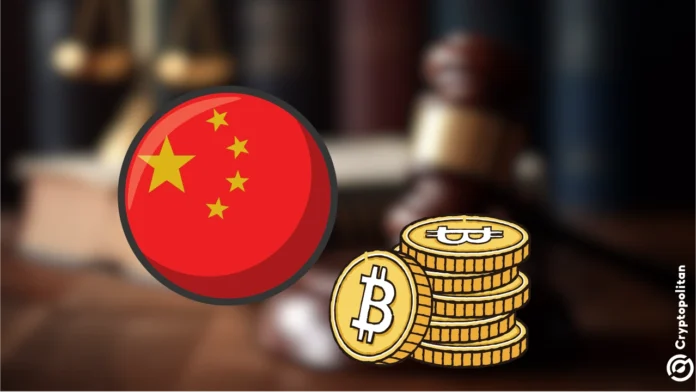Collins J. Okoth
The Shanghai Songjiang People’s Court confirmed that Chinese law did not prohibit the ownership of cryptocurrencies in mainland China. Judge Sun Jie’s opinion on the court’s official WeChat page explained that Chinese companies were the only ones restricted from interacting with virtual asset investments or issuance at will.
Judge Sun Jie was commenting on a dispute between two companies that began in 2017 and was related to virtual assets. An agricultural company expressed its idea of issuing and financing its virtual currency. The company partnered with an investment management company to help write the token’s whitepaper and issue the assets.
The agricultural company, Company X, signed a ‘Blockchain Incubation Agreement’ with the investment management company, Company S. After Company S wrote the whitepaper, Company X paid 300,000 yuan as a fee for two services.
The agricultural company allegedly assumed that the investment management company would be responsible for issuing its token. However, a misunderstanding arose during the process, leading Company X to demand a full refund of the 300,000 yuan service fee.
Judge Sun Jie commented on the case, saying that the planned token issuance and financing would have been an illegal circulation and sale of tokens. The judge explained that the plan would have been an illegal public financing without approval. The court said with finality that no individual or organization should issue or finance tokens illegally.
The court declared the case invalid since the plan would eventually become illegal. However, it still directed Company S to return 250,000 yuan after a significant evaluation.
Chinese court explains legal risks of crypto investments
While Judge Sun Jie said that owning crypto was not illegal, she explained why the government ensured strict regulations for crypto businesses. The judge confirmed that Chinese law does not describe virtual currencies. The regulations provided by the People’s Bank of China and other departments still overlook the assets.
The provided law bans any crypto-related businesses as illegal financial activities. As such, any individual or organization involved in the activities will bear any losses incurred from the said illegal activities, per the law’s provision.
Judge Sun Jie further explained the dangers of digital assets’ speculative nature, such as Bitcoin. The judge revealed that the transactions would disrupt the country’s ‘economic and financial order’. The court’s report added the prevalence of using virtual currencies for illegal activities due to their decentralization and anonymity.
China still controls over 50% of the global Bitcoin hashrate
#Bitcoin hashrate dominance is shifting to U.S. mining companies.
Chinese mining pools operate 55% of the network, while U.S. pools manage 40%.
U.S. pools primarily cater to institutional miners in America, while Chinese pools support relatively smaller miners in Asia. pic.twitter.com/kepopLWBSD
— Ki Young Ju (@ki_young_ju) September 23, 2024
The legal clarity is crucial at a time when cryptocurrencies are skyrocketing due to different factors, including Trump’s victory in the November elections. Additionally, the country still controls a huge percentage of the global Bitcoin hashrate, standing at over 50% as of September.
According to CryptoQuant’s CEO Ki Young Ju, Chinese mining pools still hold a huge percentage despite the bitcoin mining hashrate shift to U.S. companies. Young Ju also noted that China’s dominance in bitcoin mining continues despite the country’s blanket ban on businesses conducting trading and mining.
China is expected to amend its crypto regulations as it updates its anti-money laundering regulations. Galaxy Digital’s CEO Mike Novogratz also mentioned on July 14 that the country would most possibly lift its ban on crypto in the coming year.
Some parties remain skeptical about China’s motivation to uplift the current ban. Red Date Technology’s CEO, Yifan He, commented in July that the community still has no idea why the country was banning cryptocurrencies.
A Step-By-Step System To Launching Your Web3 Career and Landing High-Paying Crypto Jobs in 90 Days.
